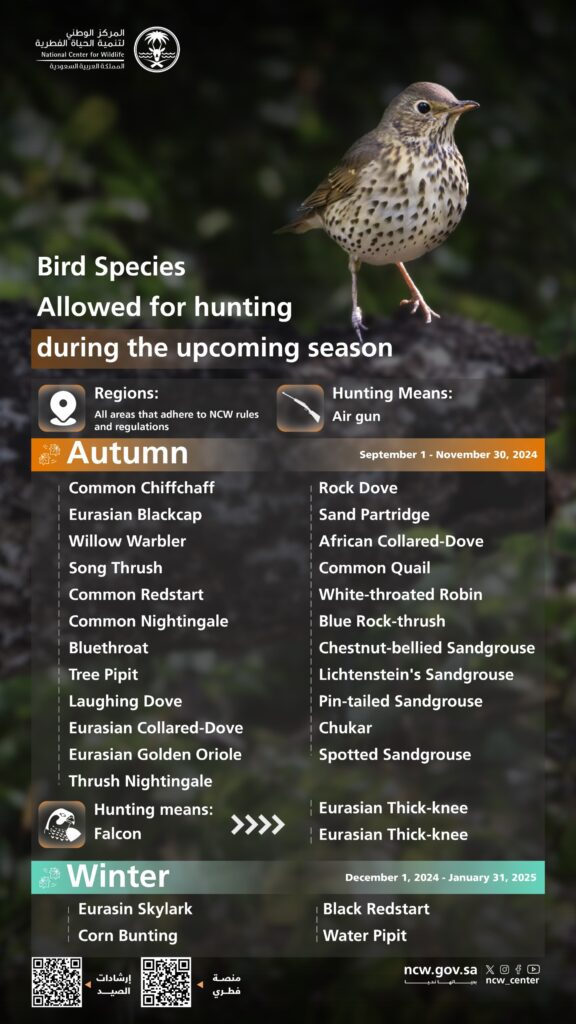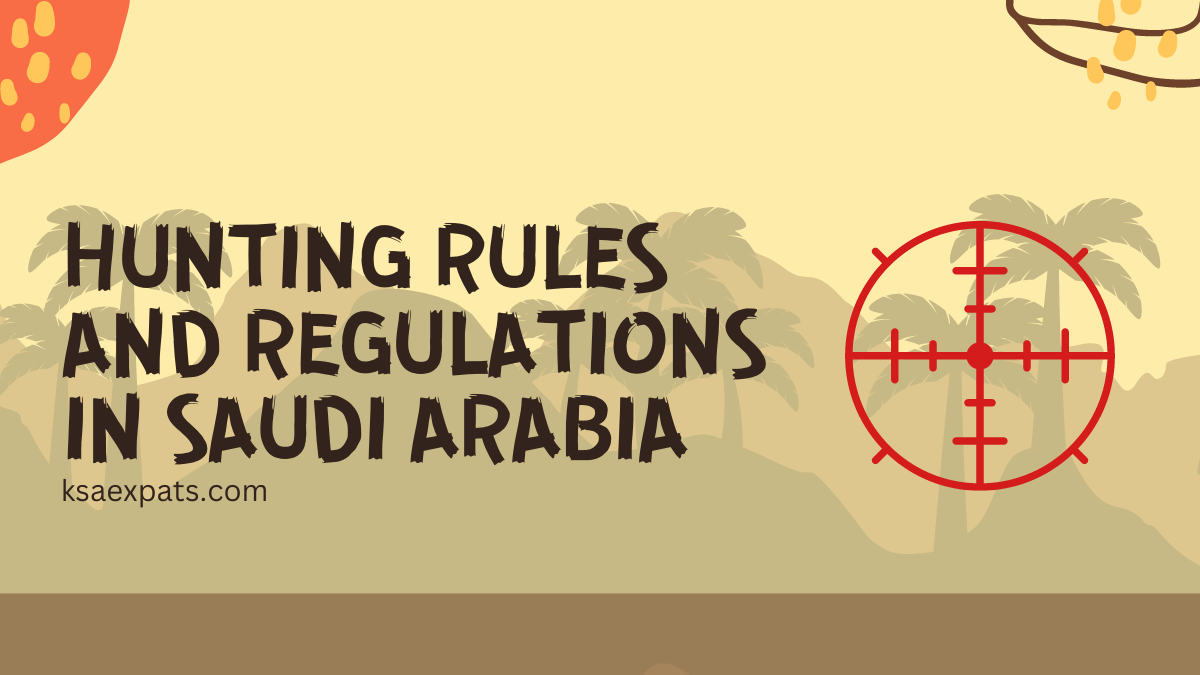Saudi Arabia, with its rich biodiversity and natural heritage, has instituted a series of regulations to ensure the sustainable and responsible practice of hunting. The National Center for Wildlife (NCW) has announced the commencement of the 2024 hunting season, running from September 1, 2024, to January 31, 2025. This season is specifically designed to align with conservation efforts and maintain ecological balance. Here’s a detailed look at the rules and regulations that hunters in Saudi Arabia must follow.
Designated Hunting Seasons and Bird Species
The hunting season is divided into two main periods:
- Autumn Season: From September 1 to November 30, 2024. During this period, hunters can target 25 bird species. These include commonly found species such as the Common Chiffchaff, Eurasian Blackcap, Willow Warbler, and others. The use of falcons is allowed for hunting specific bird types.
- Winter Season: From December 1, 2024, to January 31, 2025. This season allows for hunting four bird species, including the Eurasian Skylark and Corn Bunting. The list is carefully curated to ensure that the bird populations are not adversely affected.
Complete List of Bird Species Allowed for Hunting in Saudi Arabia (2024)
The National Center for Wildlife (NCW) has specified a list of bird species that can be hunted during the designated seasons. This list is curated to ensure sustainable hunting practices while allowing hunters to enjoy their activities responsibly. Below is the complete list of bird species approved for hunting during the Autumn and Winter seasons.
Autumn Season (September 1 – November 30, 2024)
A total of 24 bird species are permitted for hunting during the Autumn season. These include a mix of commonly found species and others that migrate through Saudi Arabia during this period:
- Common Chiffchaff
- Eurasian Blackcap
- Willow Warbler
- Song Thrush
- Common Redstart
- Common Nightingale
- Bluethroat
- Tree Pipit
- Laughing Dove
- Eurasian Collared-Dove
- Eurasian Golden Oriole
- Thrush Nightingale
- Rock Dove
- Sand Partridge
- African Collared-Dove
- Common Quail
- White-throated Robin
- Blue Rock-thrush
- Chestnut-bellied Sandgrouse
- Lichtenstein’s Sandgrouse
- Pin-tailed Sandgrouse
- Chukar
- Spotted Sandgrouse
- Eurasian Thick-knee
Winter Season (December 1, 2024 – January 31, 2025)
During the Winter season, hunters are permitted to hunt four specific bird species, chosen to align with the season’s ecological balance:
- Eurasian Skylark
- Corn Bunting
- Black Redstart
- Water Pipit
These species have been selected based on their population stability and their role within the ecosystem, ensuring that their hunting does not negatively impact the overall environmental balance.

Permitted Hunting Methods
To ensure sustainable hunting practices, the NCW has allowed only specific methods:
- Air Rifles and Falcons: These are the approved tools for hunting. The use of falcons is a traditional hunting practice in Saudi Arabia and is permitted for certain bird species.
Strict Prohibitions and Restrictions
The NCW has outlined clear restrictions to prevent overhunting and ensure safety:
- Prohibited Hunting Zones: Hunting is not allowed in specific zones to protect wildlife and maintain public safety. These zones include:
- Historic and heritage sites
- Within city limits and villages
- Within the campus of the Two Holy Mosques
- Vegetation-covered land
- Officially protected areas
- The Kingdom’s borders
- Beachfront and coastal areas up to 20 km
- Public roads and their surrounding areas
- Banned Hunting Methods: To prevent cruelty and environmental damage, several methods and tools are strictly prohibited:
- Bird traps and capture nets
- Firearms and chemicals
- Game calling machines and lures
- Tasers, smoke, gas, and toxins
- Illegal Hunting Hours: Hunting is prohibited during nighttime, from one hour before sunset to one hour after sunrise. This rule is designed to prevent accidents and ensure that hunting does not disturb nocturnal wildlife.
- Prohibited Activities: Certain activities related to hunting are banned to prevent illegal wildlife trade and ensure compliance with international wildlife conservation commitments:
- Selling, displaying, or promoting firearms and air weapons
- Hunting near residential areas, mosques, or private and public facilities
- Renting properties for the purpose of hunting
Compliance and Enforcement
The Ministry of Interior, in collaboration with the Special Forces for Environmental Security and other relevant authorities, is tasked with enforcing these regulations. Non-compliance will result in legal penalties, underscoring the Kingdom’s commitment to protecting its natural resources and wildlife.
Conclusion
Saudi Arabia’s approach to hunting regulation highlights a balanced commitment to tradition and conservation. By implementing these rules, the Kingdom aims to preserve its natural heritage, safeguard biodiversity, and promote sustainable hunting practices. These regulations ensure that hunting, a practice deeply rooted in Saudi culture, is carried out responsibly, respecting both the environment and the rich wildlife that inhabit it.
For more information, hunters are encouraged to visit the NCW’s official website and consult the detailed guidelines available on the Fitri platform, ensuring that they are well-informed and compliant with all hunting regulations.
